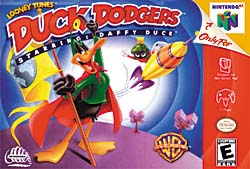Gameplay
The player controls Duck Dodgers as he must go around five planets to collect all the energy atoms, and defeat Marvin's Henchmen.
The first level Daffy enters is Planet E, which mostly takes place in a mine. Daffy has two moves, a kick and a jumping stomp, although in some levels the player is given a ray gun which either kills or stuns an enemy. Daffy is able to push some things out of the way, such as boxes or mine carts. There are a couple mini games, one where the player plays a version of Pong using Daffy's head. with the second being a basketball game. In some parts of a couple levels, the player will be put in a First Person Shooter perspective.
Throughout the levels are quarks, which gives Daffy health when collected, if a player collects 50 of them, Daffy is given an extra life. Also across the levels are energy atoms, after collecting a certain amount, a player is able to enter a boss fight. If the player can find Lola Bunny, she'll give Daffy an extra try.
Plot
Marvin the Martian has developed an ultimate weapon that will allow him to finally destroy Earth, which will ultimately allow him to take control of the universe. Upon the demonstration of the weapon, a slight snag hinders Marvin from completing his devious deed. The weapon is out of atoms, which it runs on, so he sends his minions (all of which are characters from the Looney Tunes universe) to gather atoms to fuel his weapon.
Duck Dodgers is informed by his academy of Marvin's deeds and sets out to find the one-hundred Atoms before Marvin can. This ultimately has Dodgers and his sidekick, Cadet, trekking to four different planets, including a large pirate ship, to obtain the upper-hand over Marvin.
This page is based on this
Wikipedia article Text is available under the
CC BY-SA 4.0 license; additional terms may apply.
Images, videos and audio are available under their respective licenses.
